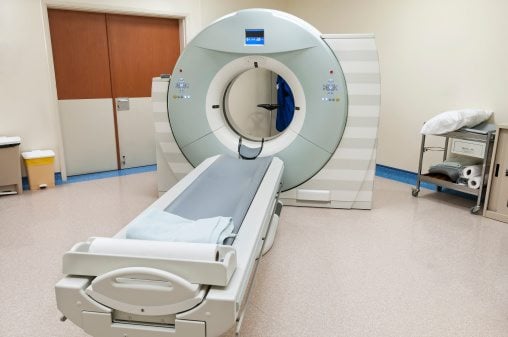CT (Computed Tomography) Frequently Asked Questions
Revere Health Imaging provides its patients with the best CT technology available. Provo, American Fork, and Salem imaging centers have 64 slice CT technology, while Coral Desert has a 16 slice scanner. http://cms.reverehealth.com//departments/provo-imaging-2/These CT machines offer radiologists the ability to look at a volume of data about the specific body part being imaged. Remarkably, these scanners obtain 0.625-millimeter slices in just seconds. Complex software algorithms then reconstruct the images in various planes to help the radiologist diagnose a potential problem.
What is a CT scan?
CT stands for Computed Tomography. It is a computerized X-ray machine that examines the body. The scanner is comprised of a table and a bracket. The bracket is the donut shape part that houses the X-ray source. The X-ray source rotates inside the bracket as the patient moves through. Data is obtained and processed by a computer. Our radiologists are always updating their protocols to keep your exam as safe and efficient as possible.
I heard Revere Health Imaging has pledged to Image Wisely. What does that mean?
A CT scan involves the use of radiation, which the radiologists take every effort to reduce. Our protocols are upgraded, dosages monitored, and the technologists trained to use the lowest possible amount of radiation.
What is dye?
In some cases, a dye called contrast material may be used. It may be put in a vein (IV) in your arm, or it may be placed into other parts of your body to see those areas better. For some types of CT scans you drink the dye. The contrast agent shows up white on CT images. This makes your organs, blood vessels, and tissues more visible, which helps the radiologist interpret these imaging studies. Revere Health radiologists work with your doctor to determine if contrast material is needed. If you have been given x-ray/CT contrast in the past and had a reaction, please inform the scheduler or technologist at the time your appointment is made, as some patients need to take some medication prior to their scan to decrease the chance of another reaction.
How long will it take to get my CT scan?
Expect the exam to be pain-free, fast, and easy. Most scans take just a few minutes to complete.
What will I experience during and after the scan?
During the procedure, you are placed on a table that slides into the center of the large, doughnut-shaped X-ray machine. Once the procedure begins, you must remain very still while the images are taken. The technician will tell you when to hold your breath and when to exhale during the scan. This helps ensure the clearest images for your physician.
After a CT exam, you can return to your normal diet and activities. If you received contrast material, you may be given special instructions. For example, you may be told to drink plenty of water in order to flush your kidneys. After the images are reviewed by the radiologist, the final report is sent to your physician, usually within hours of the completion of the scan.
Are there risks in obtaining a CT scan?
A CT scan is a very low-risk procedure. Some people experience a feeling of warmth throughout their body or the urge to urinate after receiving intravenous (IV) contrast material. These are normal and temporary reactions that go away once the scan is complete and the contrast material has passed through your system. Rarely a patient has an allergic reaction to the dye. Most of the time reactions are minor and consist of hives/itching. More serious reactions can occur but are very rare. Rarely, if contrast is used, the dye can damage the kidneys. This is usually in patients that already have kidney damage. If it were to occur, the effect is almost always temporary. Tell your scheduler or technologist if you have known kidney problems.
The amount of radiation a person receives during a CT scan is minimal and has been determined to be very safe. However, if a woman is pregnant, the risk to the fetus is unknown. It is critical that female patients inform the imaging center staff of pregnancy and discuss alternative methods of imaging. All are encouraged to discuss the risks versus the benefits of your CT scan with your doctor.
Who will interpret my CT scan? When will my results be available?
Your images will be looked at by a board-certified radiologist. A radiologist is a highly trained physician who specializes in using imaging to diagnose disease. A Revere Health radiologist will look at all of the images from your scan and provide your physician a detailed report of the findings, usually within hours of it being completed.
